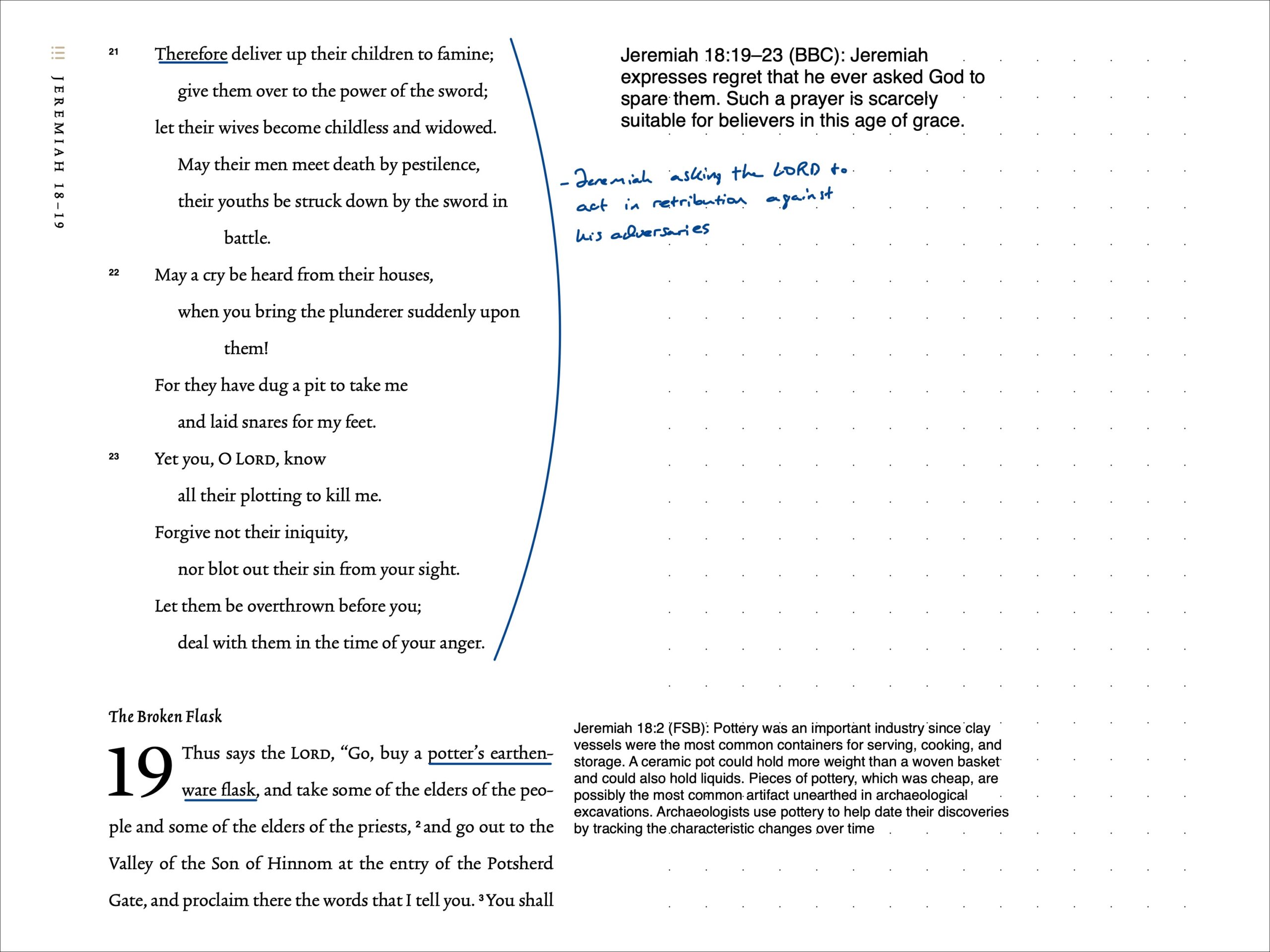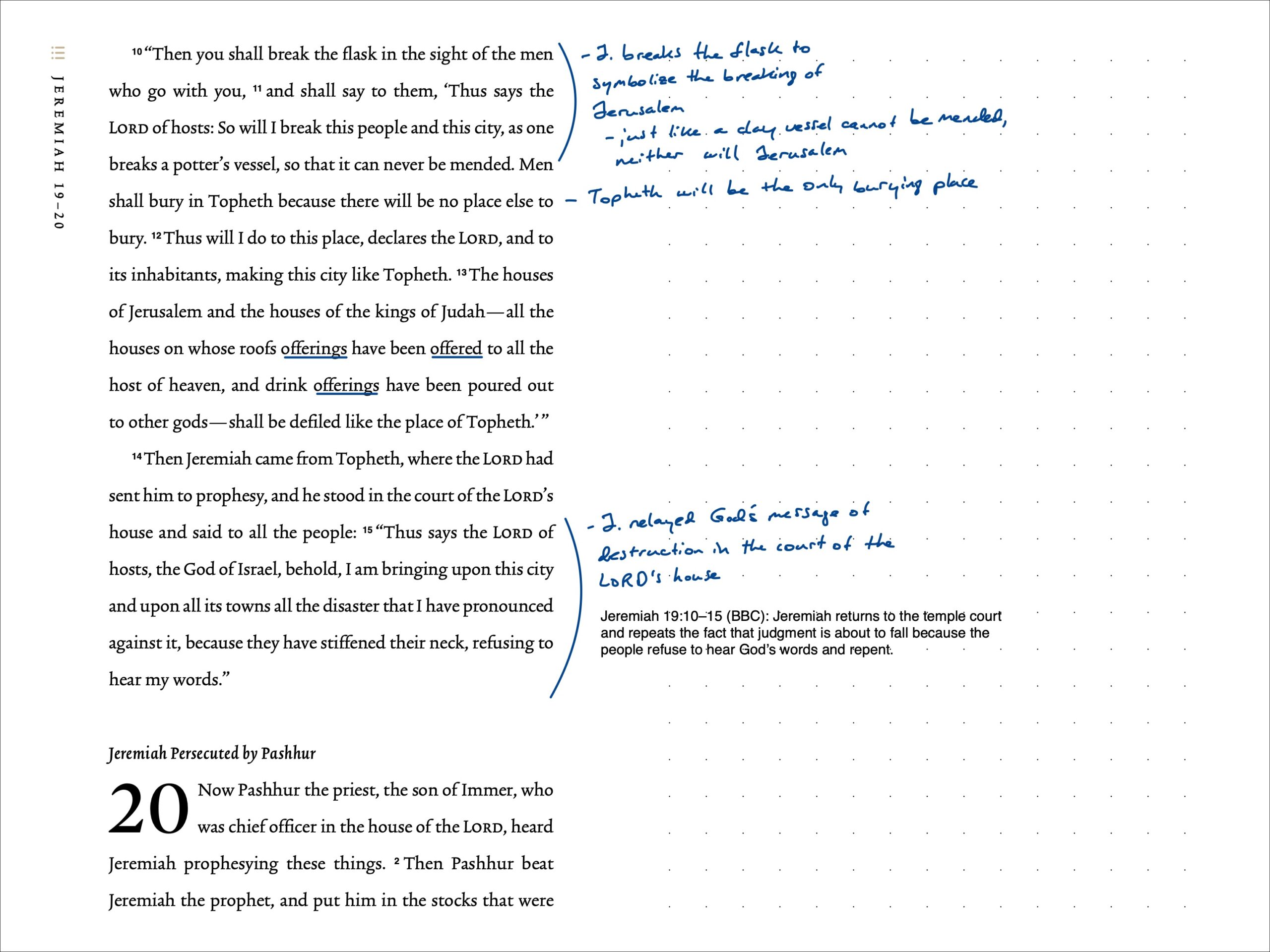| Date | Version | Reading Plan |
|---|---|---|
| @July 11, 2023 | ESV (2016) | ESV Prophets Plan 2023 |
Pericopes
- The broken flask
Notes
The chapter opens with a directive from the Lord for Jeremiah to purchase a “potter’s earthenware flask” (Jer. 19:1). Clay pottery was the most common containers for serving, cooking and storage of the time as it could hold solids as well as liquids. It is also one of the most common artifacts unearthed in archeological excavations.
Jeremiah is then told to “go out to the Valley of the Son on Hinnom” (Jer. 19:2) for a proclamation of the coming judgment. God lists the rebellious behaviors that led to their judgement: 1) forsaking Him, 2) making offers to other gods, 3) shedding innocent blood, 4) building high places to burn their sons. They had been conducting child sacrifice (connected to the worship of the Canaanite deity Molech) which was neither commanded by God nor even a thought in His mind (Jer. 19:5).
Because of this abominable behavior, destruction would come and the name of Topheth would change from the Valley of the Son of Hinnom to the Valley of Slaughter (Jer. 19:6). The valley where the people of Judah massacred their children in defiance of God would be the site of their own massacre in judgment.
In Jer. 19:9, we see that the destruction will get so bad and food supply so low that they will resort to cannibalism. This cannibalism is attested in the siege of Samaria (2 Kings 6:26–29) and in the Babylonian siege in 587 BC (Lam. 2:20, Lam. 4:10).
In Jer. 19:10, Jeremiah is instructed to smash the earthenware flask he had bought on the ground as a symbol of the breaking of Jerusalem. Just like a clay vessel that can never be mended, neither will there be mending in Jerusalem.
In the final verses (Jer. 19:14-15), Jeremiah comes to the court of the Lord’s house to relay the message of the impending destruction. Disaster was looming because the people had “stiffened their neck” and refused to hear God’s words.
Application
Things like child sacrifice and cannibalism illuminate a gruesome time in human history. It is tempting to look on these events and be thankful that we were not born into such depravity and destitution. We tend to think ourselves entirely distanced from this historic vulgarity, but are things really so different today? Have things really changed or is our corruption simply masked by a colorful, high-definition veneer?
We look at the burning of children in ritual sacrifice as abhorrent, but we end human life every day through abortion. The same death is achieved, differing only in method; replacing fire with efficient medical procedure. While it may no longer be for the worship of the pagan god, Molech, it is now done in worship of the personal gods of comfort and autonomy. The objects of idolatry may change but the heart of man to pursue them over his Creator certainly has not.
Despair-inducing as this may be, it points us to the unchanging need for our Lord. He is the same yesterday, today and forever and so is the mercy He extends. It is important to see our persistent fallenness because it enables us to see its continuous conquering by His unending and unfaltering love.
Scripture Journal Notes
Commentaries & Resources
- ESV Study Bible. (Wheaton, IL: Crossway, 2008)
- Faithlife Study Bible (Lexham Press, 2016)
- Believer’s Bible Commentary (Thomas Nelson, 2016)
- CSB Study Bible Notes (Holman Bible Publishers, 2017)
- Matthew Henry’s Commentary on the Whole Bible (Guardian Press, 1976)
- The Bible: A Reader’s Guide (Sterling Publishing, 2011)
- The Infographic Bible (Zondervan, 2018)
- ESV Digital Scripture Journal (Crossway, 2019)


